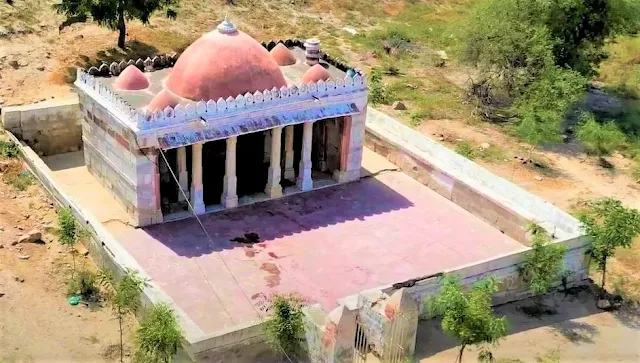Discover Bhodesar Mosque, an Oldest Mosque of the Thar Desert
The Bhodesar Mosque, the oldest mosque in the Thar Desert, was constructed in 1505 A.D. (880 A.H.) by Sultan Mehmood Shah Begada, the ex-ruler of Gujarat, India. This remarkable five-century-old mosque, built from exquisite white marble and limestone, continues to serve as a place of worship for Muslims today.
 |
| Sultan Mehmood Shah Begada Bin Muzaffar Shah Bin Ghiyyas-ud-Din |
Location of Bhodesar Mosque:
The Bhodesar Mosque is located at the foothills of the majestic Karoonjhar Mountain Hills, approximately 6.8 km (4.2 miles) from Nagarparkar town, accessible via Islamkot Road. Located next to the famous Bhodesar Lake (reservoir) with major source of water from rains of monsoon season. This makes this place not only a lovely sight but also an important part of our culture and history.
GPS Coordinates: 24.39917, 70.73100
Construction & Architecture of Bhodesar Mosque:
The rectangular shaped Bhodesar mosque measuring area of about (25 x 17) ft squares, was built in 1505 A.D, with white marbles and lime-stones. This mosque is surrounded with boundary wall of around 45ft x 40 ft . Its design and architecture highly reflects with the nearby Jain temples and Rani Sipri Mosque of Ahmedabad (Gujarat, India). Further, it is also said that some craftsmen people of Jain religion took part in the construction of this mosque and set the example of religious tolerance and harmony.
 |
| Top Eagle view of Bhodesar Mosque and Bhodesar Lake behind of it. |
 |
| Top Front view of Bhodesar Mosque |
 |
| Design of ceiling border of Bhodesar Mosque |
 |
| Top Inner view of largest dome of Bhodesar Mosque |
 |
| Top Inner view of largest dome with pillars of Bhodesar mosque |
 |
| Interior view of three Mihrab of Bhodesar Mosque |
Bhodesar mosque has a roof with five domes, one largest dome in center and four smaller domes in four corners. These domes of mosque are supported with more than 12 pillars of carved marble stones. There are some some historic and old graveyard can be seen in the courtyard of mosque.
Records from History:
In the ancient times, Bhodesar was a key stop on the trade route between Sindh, Gujarat and Rajasthan. Renowned author Mangharam Ojha has in his book 'Puraano Parkar' that, once upon a time Sultan Mehmood Ghaznvi camped near Bhodesar lake for two days, when returning back to his capital in Afghanistan in 11th century.
As per other historians, Sultan Mehmood Shah Begada had invaded Virawah (Nagarparkar) and defeated local tribes of Sodha (Rajputs) and their allied Samma defenses then he returned back to his capital Ahmedabad (Gujarat, India). After Mahmud Begada’s invasion of Virawah (Nagarparkar), diplomatic relations between Gujarat and Sindh were strained.
Later, Sultan's mother Bibi Mughli (daughter of Jam Tughluq II also known as Jam Juna II, the Sultan of Samma Dynasty) was passing by Bhodesar on a way to Thatta with a caravan and was stopped by Sodhas as a result of political tensions between Gujurat Sultanate and Sodha rulers. After returning back to the capital Ahmedabad, Bibi Mughli told the whole story of incident to his son Sultan Mehmood Begada who became enraged over that behaviour of Sodhas. He marched with the his huge army to Bhodesar and defeated Sodhas once again after their revolt.
To prevent future rebellions, Sultan Mahmud Shah Begada stationed a strong military force in Bhodesar and, in 1505 A.D., constructed a mosque as a symbol of his authority. This strategic move ensured the Sodhas could never rise against Gujarat’s rule again.
Conservation and Promotion as Heritage Site
Every year, thousands of tourists from whole Pakistan as well as around the world visit this historical and marvelous site, especially during the monsoon seasons. Provincial government of Sindh has also been taking steps in order to conserve and restore the structure and promotion of this historical mosque as tourist site.


Comments
Post a Comment